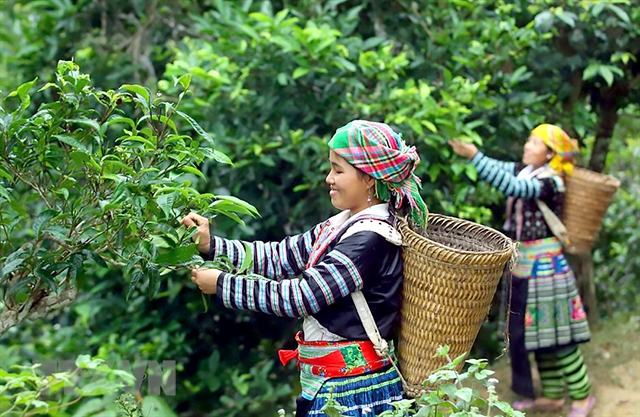 Society
Society

 |
| Dao ethnic minority people pick shan tuyết tea leaves. — VNA/VNS Photo Thế Duyệt |
HÀ NỘI — Apart from stilt houses and seemingly endless terraced paddy fields, shan tuyết tea, a speciality of Phìn Hồ Village, is something visitors cannot miss once setting foot in Tây Côn Lĩnh Mountain in the northernmost province of Hà Giang.
Phìn Hồ is a mountainous village in the most remote area of Thông Nguyên, next to Tây Côn Lĩnh Mountain, which is more than 35 kilometres from the centre of Hoàng Su Phì District. Located at an altitude of 1,500-2,000 metres, it boasts a cool climate all year round with an average temperature of 14-22 degrees Celsius, much rain, humidity of usually more than 80 per cent and frequent fog, which are favourable for growing herbal and shan tuyết tea plants.
Dao ethnic minority people harvest Phìn Hồ tea mainly from natural trees, which have grown on mountains surrounded with fog, ice, and snow for hundreds of years. Also, thanks to that cool and fresh environment, the shan tuyết tea in Hoàng Su Phì District, including in Phìn Hồ, is famous for its pure and delicious taste.
The tea has big leaves 3-6 centimetres long, with buds and young leaves covered with soft fur as white as snow. The Phìn Hồ shan tuyết tea boasts a distinctive aroma, a moreish flavour, and green watercolour while its sweetness still lingers after the drinker takes a sip of the beverage.
The old tea trees that grow at an altitude of over 1,000 metres and constantly produce new leaves and buds are the main source of income for residents in surrounding communes.
In the past, due to old-fashioned farming and processing techniques, their tea was sold at only VNĐ5,000-6,000 (just over 20 US cent at the current exchange rate) per kg of fresh tea buds, leading to a modest production value of VNĐ10-12 million per hectare each year.
Over the last ten years, Hoàng Su Phì District authorities have paid attention to tea development. The Dao ethnic people in Phìn Hồ Village have worked together to establish a tea cooperative and gradually make their tea speciality known far and wide.
The local administration has organised annual training courses to equip farmers with tea cultivating, caring, harvesting, and processing techniques under organic standards, involving more than 2,700 households.
Authorities have coordinated with the farmers’ union to establish and maintain groups of tea farmers in Nậm Tý, Túng Sán, Hồ Thầu, and Sán Sả Hồ communes. These groups have also received training in farming and harvesting techniques thanks to support from the tea cooperative.
Since 2016, several policies have been issued by the district’s administration to promote tea cultivation, upgrade equipment for the Phìn Hồ tea processing cooperative and the Hoàng Su Phì agricultural and forestry product processing cooperative, and develop packages and labels for the tea products rated three stars and higher under the One Commune, One Product (OCOP) programme.
The district is currently home to more than 4,650ha of tea farming land, nearly 3,600ha of which is harvestable, generating 14,000 tonnes of fresh buds annually.
Eight tea production and processing cooperatives are in the district, with a capacity of at least 3-5 tonnes per day. There are 20 large-scale processing facilities and 300 smaller ones owned by local households. They have also paid attention to label and trademark registration to advertise and boost the sale of their products.
At present, each hectare of tea creates an income of about VNĐ35 million, rising more than three-fold from 10 years ago, helping to lift all tea farming households in Phìn Hồ out of poverty. Meanwhile, workers of the Phìn Hồ tea processing cooperative earn a monthly per capita income of VNĐ5-15 million, five times higher than when this cooperative was just established.
Two cooperative products obtained a national five-star rating in the OCOP programme in 2020.
Achieving the OCOP certificates and the 2020 National Quality Award will create a chance for the cooperative to improve its management by applying the best production and business practices, helping enhance its competitiveness amid the country’s regional and international integration process. — VNS




